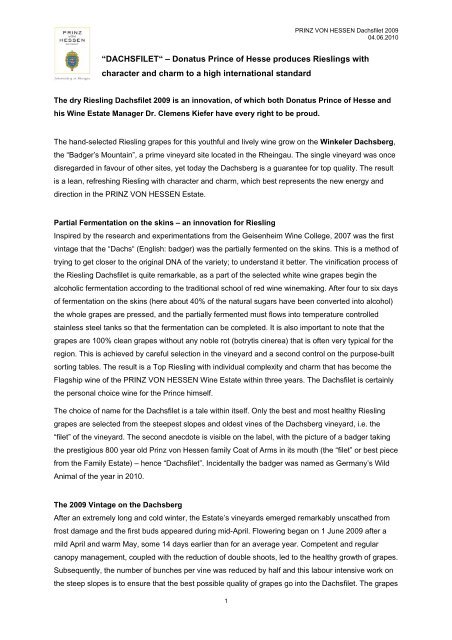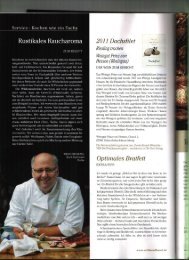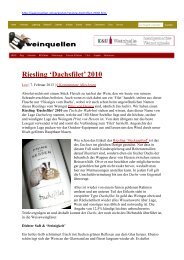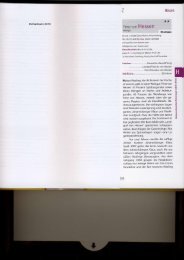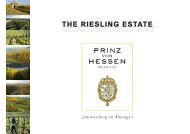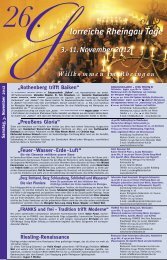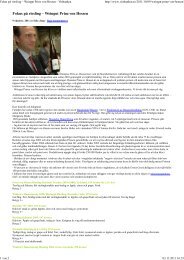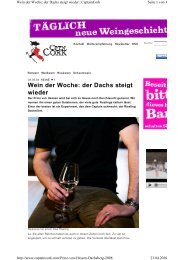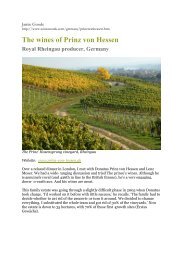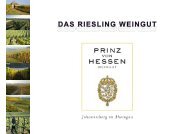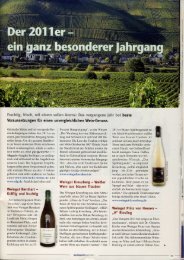DACHSFILET - Weingut Prinz von Hessen
DACHSFILET - Weingut Prinz von Hessen
DACHSFILET - Weingut Prinz von Hessen
You also want an ePaper? Increase the reach of your titles
YUMPU automatically turns print PDFs into web optimized ePapers that Google loves.
1<br />
PRINZ VON HESSEN Dachsfilet 2009<br />
04.06.2010<br />
“<strong>DACHSFILET</strong>“ – Donatus Prince of Hesse produces Rieslings with<br />
character and charm to a high international standard<br />
The dry Riesling Dachsfilet 2009 is an innovation, of which both Donatus Prince of Hesse and<br />
his Wine Estate Manager Dr. Clemens Kiefer have every right to be proud.<br />
The hand-selected Riesling grapes for this youthful and lively wine grow on the Winkeler Dachsberg,<br />
the “Badger’s Mountain”, a prime vineyard site located in the Rheingau. The single vineyard was once<br />
disregarded in favour of other sites, yet today the Dachsberg is a guarantee for top quality. The result<br />
is a lean, refreshing Riesling with character and charm, which best represents the new energy and<br />
direction in the PRINZ VON HESSEN Estate.<br />
Partial Fermentation on the skins – an innovation for Riesling<br />
Inspired by the research and experimentations from the Geisenheim Wine College, 2007 was the first<br />
vintage that the “Dachs“ (English: badger) was the partially fermented on the skins. This is a method of<br />
trying to get closer to the original DNA of the variety; to understand it better. The vinification process of<br />
the Riesling Dachsfilet is quite remarkable, as a part of the selected white wine grapes begin the<br />
alcoholic fermentation according to the traditional school of red wine winemaking. After four to six days<br />
of fermentation on the skins (here about 40% of the natural sugars have been converted into alcohol)<br />
the whole grapes are pressed, and the partially fermented must flows into temperature controlled<br />
stainless steel tanks so that the fermentation can be completed. It is also important to note that the<br />
grapes are 100% clean grapes without any noble rot (botrytis cinerea) that is often very typical for the<br />
region. This is achieved by careful selection in the vineyard and a second control on the purpose-built<br />
sorting tables. The result is a Top Riesling with individual complexity and charm that has become the<br />
Flagship wine of the PRINZ VON HESSEN Wine Estate within three years. The Dachsfilet is certainly<br />
the personal choice wine for the Prince himself.<br />
The choice of name for the Dachsfilet is a tale within itself. Only the best and most healthy Riesling<br />
grapes are selected from the steepest slopes and oldest vines of the Dachsberg vineyard, i.e. the<br />
“filet” of the vineyard. The second anecdote is visible on the label, with the picture of a badger taking<br />
the prestigious 800 year old <strong>Prinz</strong> <strong>von</strong> <strong>Hessen</strong> family Coat of Arms in its mouth (the “filet” or best piece<br />
from the Family Estate) – hence “Dachsfilet”. Incidentally the badger was named as Germany’s Wild<br />
Animal of the year in 2010.<br />
The 2009 Vintage on the Dachsberg<br />
After an extremely long and cold winter, the Estate’s vineyards emerged remarkably unscathed from<br />
frost damage and the first buds appeared during mid-April. Flowering began on 1 June 2009 after a<br />
mild April and warm May, some 14 days earlier than for an average year. Competent and regular<br />
canopy management, coupled with the reduction of double shoots, led to the healthy growth of grapes.<br />
Subsequently, the number of bunches per vine was reduced by half and this labour intensive work on<br />
the steep slopes is to ensure that the best possible quality of grapes go into the Dachsfilet. The grapes
PRINZ VON HESSEN Dachsfilet 2009<br />
04.06.2010<br />
were hand-picked under rays of sunshine by the selected team and showed a must weight of 100 °Oe<br />
to 120 °Oe. The yield lay about 20% below the long-term average, yet the result was 100% perfectly<br />
healthy grapes that became the elegant, complex Dachsfilet with depth of character, Riesling typical<br />
fruit aromas and a juicy, lean freshness.<br />
Change and Innovation<br />
Climatic changes over the past 20 to 30 years in the Rheingau have had a positive effect on<br />
winemaking. Thanks to the much higher average temperatures, the higher altitude vineyard sites (as in<br />
particular with the Dachsberg at 180 meters above sea level) now provide the prerequisites for<br />
producing highly acclaimed wines. The PRINZ VON HESSEN Wine Estate nurtures some of the oldest<br />
vines (over 35 years old) and exceptionally low yields (3,500 kg grapes per hectare) – a practice that<br />
guarantees a high standard of quality. Over the past few years, Donatus Prince of Hesse and Dr.<br />
Clemens Kiefer have also directed their focus and investment in the vineyards and winemaking<br />
equipment so that each and every single vineyard is trimmed to produce the best possible<br />
physiologically ripe grapes, bringing out the best from the site and variety. The young<br />
and energetic team led by Clemens Kiefer and his cellar master Sascha Huber work<br />
with professionalism and a great deal of passion. The vicinity of the Geisenheim<br />
Viticultural College is useful with exchanging the growing knowledge and the ideas are<br />
practiced in all processes. The Prince is proud of the innovative direction of his Estate:<br />
“The collaboration of the traditional and the modern are reflected in all areas of the<br />
Estate. On the one hand, we produce wines with a lively, racy and fresh character that<br />
are contemporary, and reflect the soils and climate, yet on the other hand, we have our<br />
focus for Riesling, that is our acknowledgement in traditional keeping for the Rheingau”.<br />
The PRINZ VON HESSEN Wine Estate vineyards are graced with being over 70%<br />
classed Firth Growth vineyard sites and is committed to producing Riesling that is<br />
typical and classically Rheingau. The wines reflect their individual terroirs, uphold<br />
traditions and are 100% Estate grown, and yet the wines are hand-crafted,<br />
contemporary, consumer friendly and charming.<br />
Technical details: Alcohol: 13.0 % by vol.<br />
Acidity: 7.2 g/l<br />
Residual Sugar: 9.0 g/l<br />
_______________________<br />
Critical acclaim for the Dachsfilet:<br />
„On the table stands the Riesling Dachsfilet 2008 of the Wine Estate PRINZ VON<br />
HESSEN in Johannisberg, Rheingau. (…) For me, this classy Riesling marks even more<br />
than the (felicitous) great wines the estate’s ascension into the first league<br />
after laborious work. (…) PRINZ VON HESSEN might become a must-have for Rheingau<br />
Riesling fans like Gunther Kuenstler.”<br />
(Martin Lambeck, Germany, www.welt.de, 02.10.2009)<br />
2
3<br />
PRINZ VON HESSEN Dachsfilet 2009<br />
04.06.2010<br />
„<strong>Prinz</strong> <strong>von</strong> <strong>Hessen</strong> Dachsfilet Riesling 2008 Rheingau 12% alcohol. From the Badgers’<br />
mountain, Dachsberg, this is made like a red wine, with fermentation of skins until<br />
40% of the sugar has been used, and then pressing. Wonderfully textured with a hint<br />
of sweetness to the intense, minerally, spicy limey fruit. There are some richer,<br />
tropical notes, too. Brilliant precision and nice tension between the richness and<br />
minerality. 93/100“<br />
(Jamie Goode, UK, www.wineanorak.com, 03.11.2009)<br />
“These are Rieslings of exceptional quality placed at the upper end of the market<br />
which will appeal to diners with a detailed knowledge of German wines. They will<br />
also pleasantly surprise others who are adventurous enough to opt for them on a<br />
wine list.”<br />
(Frank Corr, Ireland, Hotel & Catering Review, Oct. 2009)<br />
“More exotic a Riesling cannot scent! Gooseberries, lychee, pineapple, and, and,<br />
and. Bright minerality and finesse. The name originates from using the best grapes<br />
(the “filet”) of the premium site “Dachsberg”!”<br />
(Wein & Co Magazin, Austria, Oct. 2009)<br />
Contact:<br />
By the way:<br />
Dachsfilet 2008 on British Airways First Class in fall 2010!<br />
_______________________<br />
For samples (also of our Riesling „H“ QbA or the new Riesling Kabinett 2009) and suppliers we may ask you to<br />
contact the Wine Estate PRINZ VON HESSEN or TxB International Fine Wines – thank you!<br />
Winery<br />
Dr. Clemens Kiefer<br />
PRINZ VON HESSEN Winery<br />
Johannisberg im Rheingau<br />
Grund 1<br />
65366 Geisenheim<br />
Germany<br />
T: +49 6722 40918 – 0<br />
F: +49 6722 40918 – 20<br />
E: ckiefer@prinz-<strong>von</strong>-hessen.de<br />
www.prinz-<strong>von</strong>-hessen.de<br />
Press and trade<br />
Lenz M. Moser<br />
TxB International Fine Wines GmbH<br />
Am Opernplatz 2<br />
60313 Frankfurt / Main<br />
Germany<br />
T: +49 69 463088 – 0<br />
F: +49 69 463088 – 20<br />
M: +49 172 6879701<br />
E: lenz.moser@txb-finewines.com<br />
www.txb-finewines.com


